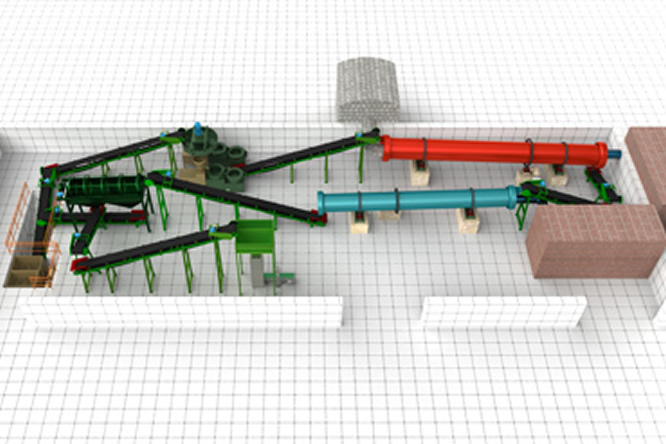An
organic fertilizer production line is a complete set of equipment that processes organic wastes into high-quality organic fertilizer through harmless treatment and resource utilization.
- Raw Material Pretreatment: Sort and crush organic wastes to remove impurities like stones and metals. Adjust moisture content and carbon-nitrogen ratio to prepare for fermentation.
- High-Temperature Aerobic Fermentation: Feed pretreated raw materials into fermentation equipment (such as trough-type turners, windrow turners). Control temperature and supply oxygen via turning to promote microbial decomposition of organic matter. Achieve harmlessness (kill pathogens and insect eggs) and maturation, with a fermentation cycle of 7-15 days typically.
- Post-Treatment Processing: Crush and screen matured materials to remove incompletely decomposed impurities. Add functional strains or auxiliary materials as needed to enhance fertilizer efficiency.
- Granulation Molding: Use equipment like double-roll extrusion granulators or disc granulators to process powdery materials into granular form, facilitating storage, transportation and application.
- Drying and Cooling: Dry the granules to reduce moisture to the standard range, then cool them. Improve particle stability and prevent caking or deterioration.
- Screening and Packaging: Remove unqualified granules through screening. Qualified products are weighed and sealed by automatic packaging machines to complete the finished product delivery.
- Pretreatment Equipment: Crushers, mixers, screening machines (for impurity removal).
- Fermentation Equipment: Trough-type turners, windrow turners, fermentation tanks (closed fermentation).
- Processing Equipment: Secondary crushers, mixers (for adding strains/auxiliary materials).
- Granulation Equipment: Double-roll extrusion granulators, disc granulators, drum granulators.
- Drying and Cooling Equipment: Dryers, coolers.
- Post-Treatment Equipment: Finished product screening machines, automatic packaging machines, belt conveyors (for material transfer).
- Waste Recycling: Solve the pollution problem of organic wastes and realize resource recycling.
- Excellent Fertilizer Effect: Organic fertilizer is rich in organic matter and trace elements. It can improve soil quality and crop quality, meeting the needs of green agriculture.
- Environmental Compliance: High-temperature harmless treatment during fermentation avoids secondary pollution, with emissions meeting environmental standards.
- Flexible Adaptability: Customize production line configurations according to raw material types and capacity requirements (small-scale: 0.5-1 ton/hour, large-scale: 5-10 ton/hour).
- Applicable Raw Materials: Livestock and poultry manure (chicken manure, cow manure, sheep manure), crop straw, food waste, mushroom residue, distiller's grains, traditional Chinese medicine residue and other organic wastes.
- Finished Product Types: Granular organic fertilizer, powdered organic fertilizer, compound organic fertilizer (added with nitrogen, phosphorus and potassium nutrients), bio-organic fertilizer (added with functional microorganisms).
